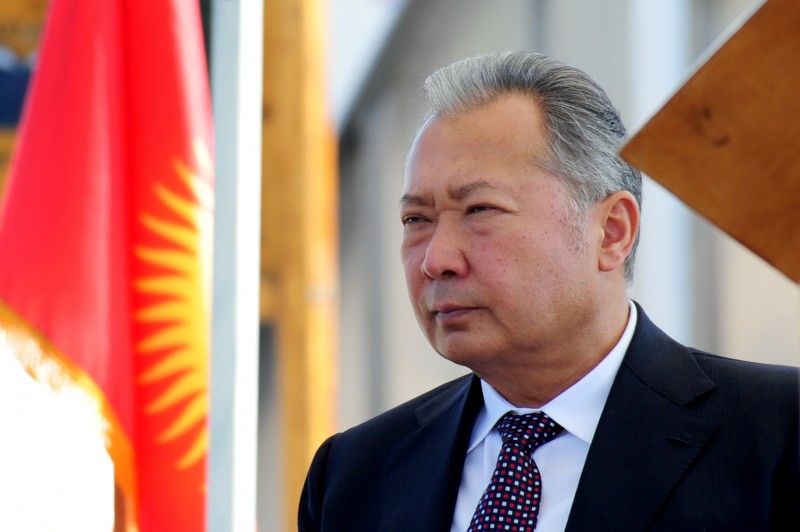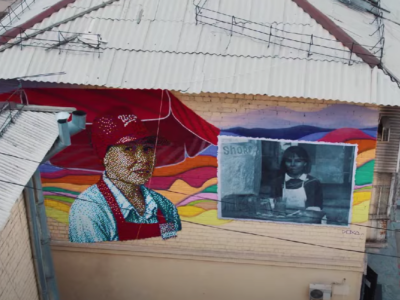
Kyrgyzstan's Ex-President Kurmanbek Bakiyev. Wikipedia image.
Kurmanbek Bakiyev, the second of Kyrgyzstan's two exiled presidents, has a new book out. In it he absolves himself of blame for a reign drenched in corruption and bloody political violence that led to the death of over 500 people.
Aida Kasymalieva, a leading journalist from the Central Asian country wrote on November 4 a response to the book Pain, Love and Hope: My Kyrgyzstan in the form of a blog on leading news portal Akipress. In it she recalls in 2011 interviewing the country's first fugitive president and Bakiyev's predecessor, Askar Akayev.
Akayev, a former physicist who took control of the country after independence, was ousted in Kyrgyzstan's ‘Tulip’ revolution in 2005 and shared Bakiyev's lack of repentance:
В 2011 году, работая в Москве корреспондентом радио «Азаттык», я готовилась к интервью с экс-президентом Кыргызстана Аскаром Акаевым и очень волновалась. Мне казалось, что это будет памятное интервью в моей карьере и жизни. Хотя я задавала вопросы и записывала интервью по телефону, мы проговорили больше часа. Раз за разом, с упрямством и дерзостью, свойственных молодости, я повторяла один свой вопрос – не желает ли он попросить прощения у кыргызского народа?
Вместо этого Аскар Акаев обвинял кого только мог вспомнить, но не себя. Я тогда поразилась человеческой сущности – как можно не осознавать вины и просто попросить прощения. Пендечилик, говорят кыргызы, что переводится, как человеческая слабость. Теперь же очередное ежегодное интервью Аскара Акаева я даже не читаю – что он интересного или нового может сказать нам, не покаявшись?
In 2011, while working in Moscow as a correspondent from radio “Azattyk” [Kyrgyz service of State Department-sponsored RFE/RL] I was nervously preparing for an interview with the former president of Kyrgyzstan, Askar Akayev. It seemed to me that it would be one of the most memorable interviews in my career and my life […] We talked for over an hour. Time after time, with the stubbornness and impudence of youth, I repeated my single question — did he want to apologize to the Kyrgyz people? Instead, Askar Akayev accused everybody whose name he could remember, but not himself.
I was struck by the human ego — how can you evade the feelings of guilt and not simply ask for forgiveness? Pendechilik is a Kyrgyz word that translates as human weakness. Now when regular annual interviews with Askar Akayev appear in the news, I do not even read them. What is there he can say that is interesting or new if he remains unrepentant?
Akayev's regime was also tarnished by graft, nepotism and blood, notably when six people were killed in a standoff between protesters and police in 2002. But its violence paled in comparison to that of the Bakiyevs, credited with sending a severed ear by post to a former chief of staff subsequently murdered by henchmen.
Yet Bakiyev's self-depiction is rather different in the opening lines of his book, where he writes of himself dreaming of “snow-capped peaks, clear mountain lakes, the tickling smell of the spring grasses and the first rain, the striking view of shining, eternal glaciers.” The truth, he writes, in a nod to the country's nomadic heritage, is “bitter like the smoke from a shepherd's campfire.”
Bakiyev, Kasymalieva noted in a recent Facebook post, might have spent some time reflecting on the ills of his close relatives, such as elder brother Janysh, who oversaw the security services that opened fire on protesters in 2010, or his son Maxim, who allegedly acquired huge swathes of the struggling economy.
Instead, he goes down the route of self-justification, claiming the “biggest mistake” of his career was appointing in 2007 as Prime Minister Almazbek Atambayev, the country's current president, who he describes as a lazy and prone to drinking.
His 2010 overthrow, he concluded, was sponsored by a “third force” he never explicitly names.
Kasymalieva rounds off her blog with a wish that the current president and future presidents of the country will not spend their retirements abroad writing diatribes about erstwhile political rivals, and instead follow the example of third President Roza Otunbayeva who handed over power peacefully and willingly:
Давайте молиться, те, которые на берегу, и смотрят на изгнанную лодку, чтобы мы всегда впредь гордились нашими президентами. И настоящими, и особенно бывшими. Чтобы не было столько тонн горечи в книгах экс-президентов. Чтобы они на пенсии гуляли по бульвару Эркиндик, а молодое поколение стояло в очереди к ним за селфи. Чтобы к катающейся на коньках Розе Исаковне присоединился катающийся на лыжах Алмазбек Шаршенович.
Это же выполнимо?
Let those of us that have remained behind on this coast, looking at the fugitive's boat, pray that we are always proud of our presidents in the future, both present and past. [Pray] that there will not be so many tons of bitterness in the books of e-presidents. That they will walk as pensioners down Erkindik boulevard, and the younger generation will form a queue to take selfies with them. So that our horse riding Roza Otunbayeva will be joined by [fourth president] Almazbek Atambayev on skis.
Is that realistic?






